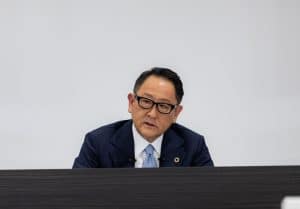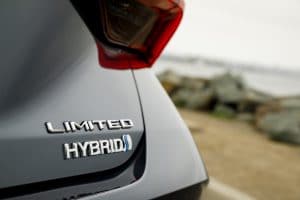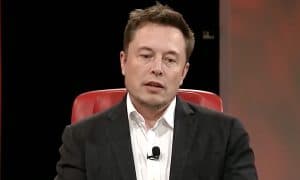
Tesla shares dipped nearly 2% Friday but still closed at nearly $430 a share, giving the upstart automaker a market capitalization of $408 billion. To save you the math, that’s more than all seven of the mainstream Japanese automakers – including giant Toyota which has a market valuation of “just” $189 billion.
That doesn’t sit well with Akio Toyoda, the Toyota CEO who all but sniffed at his American rival during an earnings call. While the grandson of the company’s founder did start out with a bit of praise for Tesla’s meteoric rise, he went on to suggest it wasn’t a serious player in the automotive market, at least not yet.
“Tesla says that their recipe will be the standard in the future, but what Toyota has is a real kitchen and a real chef,” the 64-year-old Toyoda said, responding to a reporter’s question.
(Despite record Q3 results, Tesla stock only gets small bump.)

“We are losing when it comes to the share price,” he added. “But when it comes to products, we have a full menu that will be chosen by customers.”
Toyota finished 2019 as number two in the global sales sweepstakes, just behind German rival Volkswagen AG. Tesla is hoping to finish 2020 with all-time-high volume of around 500,000, That total is barely 5% of Toyota’s, which hit 10.74 million sales last year, though volume will be off in 2020 due to pandemic-related issues.
But Toyoda is learning a lesson that his Detroit rivals have already had to come to grips with: that Wall Street and investors don’t see Tesla playing in the same game. At least, that’s what they’re sticking with while CEO Elon Musk lays out plans to rapidly expand production, with Tesla’s Shanghai plant accelerating operations and new plants under construction in near Berlin and Austin, Texas.
(Tesla shipping Model 3 sedans from Shanghai to Europe.)
The stock price gap was a central issue during General Motors’ earnings call last week, CEO Mary Barra repeatedly hammered on its flat numbers by market analysts. For her part, Barra said she believes that GM’s unexpectedly strong earnings, as well as its push into electrification “will change the way customers and investors will view our company.” But that isn’t happening yet.

While Toyota may have a long history – and a real chef – the company is facing the same sort of challenges as its rivals: how to meet changing government mandates and consumer demands. So far, Tesla is the only automaker, at least outside of China, to make a real successful push into the battery-electric vehicle market. Of all its major, traditional competitors, Toyota has been one of the most reluctant to follow its lead.
Toyota is still focused on conventional hybrids and is dipping its toes deeper into the waters of plug-in hybrids. But it remains reluctant to shift focus to pure BEVs. Even little Aston Martin and ultra-luxurious Bentley have announced more aggressive programs, the latter, a subsidiary of Volkswagen AG, last week announced that it will be using 100% BEV powertrains by the end of the decade.
When will Toyota jump in is a big question, and Toyoda and other company officials have hinted in recent months that they could – and would – move quickly once that decision is made. The Nikkei recently reported that Toyota has laid out internal plans of reaching sales of 500,000 BEVs annually by mid-decade.
(Toyota surprises analysts, turns small Q1 profit.)
Perhaps when the plan is fully outlined and truly competitive offerings are unveiled, then investors will begin to view Toyota in the same light as Tesla.







